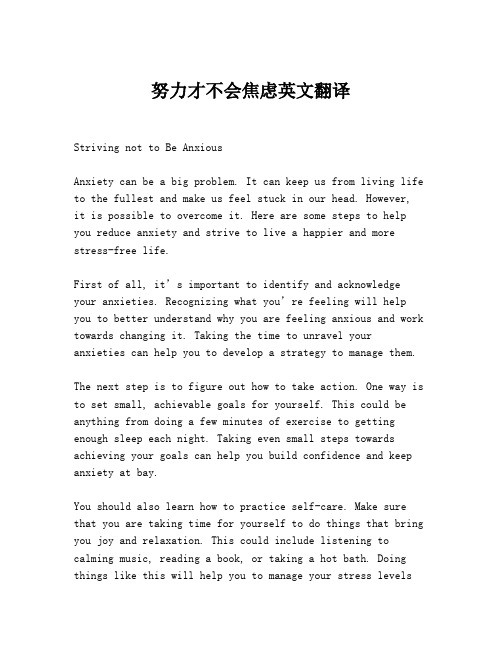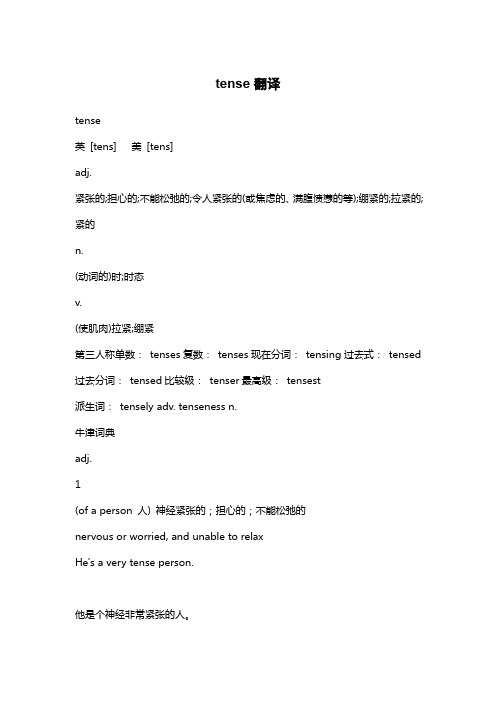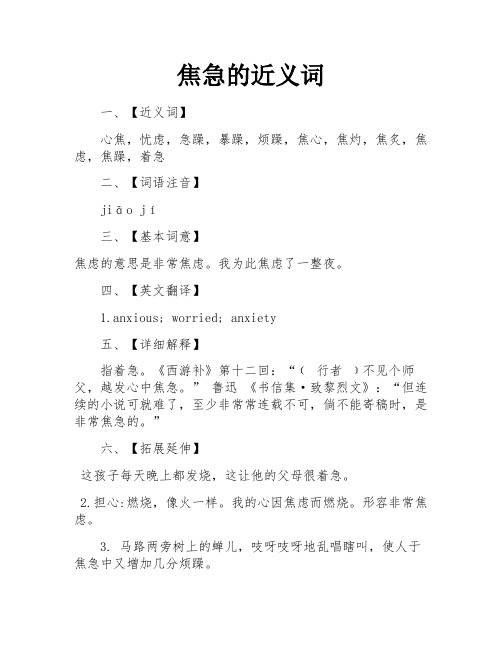焦虑翻译
努力才不会焦虑英文翻译

努力才不会焦虑英文翻译Striving not to Be AnxiousAnxiety can be a big problem. It can keep us from living life to the fullest and make us feel stuck in our head. However,it is possible to overcome it. Here are some steps to help you reduce anxiety and strive to live a happier and more stress-free life.First of all, it’s important to identify and acknowledge your anxieties. Recognizing what you’re feeling will help you to better understand why you are feeling anxious and work towards changing it. Taking the time to unravel youranxieties can help you to develop a strategy to manage them.The next step is to figure out how to take action. One way is to set small, achievable goals for yourself. This could be anything from doing a few minutes of exercise to getting enough sleep each night. Taking even small steps towards achieving your goals can help you build confidence and keep anxiety at bay.You should also learn how to practice self-care. Make sure that you are taking time for yourself to do things that bring you joy and relaxation. This could include listening to calming music, reading a book, or taking a hot bath. Doing things like this will help you to manage your stress levelsand clear your mind.Finally, it’s important to be mindful of your thoughts and emotions. Take the time to reflect on your feelings and determine if they are rooted in a fear or if they are simply a product of your imagination. Once you realize that most of your worries are unfounded, you can start to see them for what they really are and work on changing your mindset.By following these steps, you can strive to live a stress-free and anxiety-free life. Remember that overcoming anxiety takes time and patience, but with dedication and hard work, it is definitely achievable. So take the time to focus on your mental health and strive to reach new heights!。
tense翻译

tense翻译tense英[tens] 美[tens]adj.紧张的;担心的;不能松弛的;令人紧张的(或焦虑的、满腹愤懑的等);绷紧的;拉紧的;紧的n.(动词的)时;时态v.(使肌肉)拉紧;绷紧第三人称单数:tenses复数:tenses现在分词:tensing过去式:tensed 过去分词:tensed比较级:tenser最高级:tensest派生词:tensely adv. tenseness n.牛津词典adj.1(of a person 人) 神经紧张的;担心的;不能松弛的nervous or worried, and unable to relaxHe's a very tense person.他是个神经非常紧张的人。
She sounded tense and angry.她的声音听起来又气又急。
2(of a situation, an event, a period of time, etc. 形势、事件、时期等) 令人紧张的(或焦虑的、满腹愤懑的等)in which people have strong feelings such as worry, anger, etc. that often cannot be expressed openlyI spent a tense few weeks waiting for the results of the tests.等候测试结果的这几个星期里我寝食不安。
The atmosphere in the meeting was getting more and more tense.会议的气氛越来越紧张。
3(of a muscle or other part of the body 肌肉或身体部位) 绷紧的;不松弛的tight rather than relaxedA massage will relax those tense muscles.按摩会使紧张的肌肉松弛。
焦急的近义词

焦急的近义词一、【近义词】心焦,忧虑,急躁,暴躁,烦躁,焦心,焦灼,焦炙,焦虑,焦躁,着急二、【词语注音】jiāo jí三、【基本词意】焦虑的意思是非常焦虑。
我为此焦虑了一整夜。
四、【英文翻译】1.anxious; worried; anxiety五、【详细解释】指着急。
《西游补》第十二回:“﹝行者﹞不见个师父,越发心中焦急。
” 鲁迅《书信集·致黎烈文》:“但连续的小说可就难了,至少非常常连载不可,倘不能寄稿时,是非常焦急的。
”六、【拓展延伸】这孩子每天晚上都发烧,这让他的父母很着急。
2.担心:燃烧,像火一样。
我的心因焦虑而燃烧。
形容非常焦虑。
3. 马路两旁树上的蝉儿,吱呀吱呀地乱唱瞎叫,使人于焦急中又增加几分烦躁。
我站起来,不停地踱步,焦急地等待着。
有时候,我想回家,却不能,只好焦急地爬上最高的山往外看,面对脚下蜿蜒的山路,呼唤着亲人的名字。
我飘忽的眼神渴望得到一点安慰,我也祈祷天上的银鸽能捎去我的信息,祝福我遥远的家乡安康。
6. 爸爸露出了焦急的神情,一边找刀,一边自言自语:“要是完不成任务,怎么办呢?”。
7. 人便焦急起来,嚷道,“怕什么?怎的不拿!”。
8.看到妈妈头上落了一层白雪,焦虑的脸上露出了笑容,雪好像被家人融化了。
9. 他开始焦急得坐立不安了,于是点着了一支雪茄。
10.这位一向和蔼可亲的母亲,现在在暴风雨中焦急地喘着气寻找儿子。
11.同学们顿时来了兴趣,眼睛里流露出非常焦虑的光芒。
总是打头阵的班长信心满满地准备比赛,不料被老师制止了。
12. 这时,迷离恍惚已经被焦急所代替,而焦急又开始使她感到了饥渴。
13. 为求看到一线曙光,焦急的冰冰游走大街小巷,寻遍各种隐世医术,但结果令她啼笑皆非。
14. 我发现有一个同学没带语文书,正在他焦急不安的时候,我急中生智拿出了我姐的语文书,借给了他。
15. 在手术室外,向阳的家人正焦急的等待着,手术室内,李医生正屏息凝神地把一枚子弹从向阳的胸膛里取出,完成了一个漂亮的手术。
轻微焦虑的英语作文带翻译

轻微焦虑可能源自个人问题、社交问题和工作问题等多种因素。个人因素包括自我怀疑、自尊心低和过度追求完美等,这些因素会导致持续的担忧和不安。社交因素,如同龄人的压力、对他人的评判和对接受的需求等,也会引发个体内的焦虑感。此外,工作相关因素,如过多的工作负担、紧迫的截止日期和职场冲突等,也可能导致轻微焦虑症状的出现。
真实案例:
为了更好地理解轻微焦虑,让我们来考虑两个真实案例。艾米丽,一名大学生,在考试前会感到轻微焦虑,并常常担心自己的表现。为了应对这种情况,艾米丽练习深呼吸,并向教授寻求指导。同样,约翰是一名职场人士,他经常对工作演示感到焦虑。他通过提前充分准备,并向同事寻求反馈来应对轻微焦虑。这些案例突显了应对策略在减轻轻微焦虑对日常生活的影响方面的有效性。
Consequences of Mild Anxiety:
The consequences of mild anxiety can range from a decreased quality of life to impaired productivity. In personal life, individuals may experience disrupted sleep patterns, difficulty in maintaining relationships, and an overall sense of unhappiness. Professionally, mild anxiety can lead to reduced concentration, poor decision-making, and decreased job performance. Moreover, repeated episodes of mild anxiety can escalate into more severe anxiety disorders if left unaddressed.
浅谈焦虑英文翻译作文

浅谈焦虑英文翻译作文Title: Exploring Anxiety: Understanding and Coping with the Challenges。
Anxiety is a common human experience that can manifest in various forms and degrees of intensity. It is a natural response to stress or perceived threats, but when it becomes excessive or overwhelming, it can significantly impact an individual's well-being and daily functioning. In this essay, we will delve into the nature of anxiety, its causes, effects, and strategies for coping with it.Firstly, it's important to understand that anxiety is not a sign of weakness or inadequacy. It is a complex emotional and physiological response that serves as a mechanism for self-preservation. When faced with a perceived threat, whether real or imagined, the body's "fight or flight" response is activated, leading to a surge of adrenaline and heightened awareness. This response is crucial for survival in threatening situations.However, when anxiety becomes chronic or disproportionate to the actual threat, it can have detrimental effects on mental and physical health. Persistent feelings of worry, fear, and apprehension can interfere with daily activities, relationships, and overall quality of life. Physical symptoms such as muscle tension, fatigue, insomnia, and digestive issues may also accompany chronic anxiety.The causes of anxiety are multifaceted and can vary from person to person. Genetics, brain chemistry, personality traits, and life experiences all play a role in predisposing individuals to anxiety disorders. Traumatic events, chronic stress, major life changes, and underlying medical conditions can also trigger or exacerbate anxiety symptoms.Moreover, societal factors such as pressure to succeed, social comparison, and stigma surrounding mental health can contribute to feelings of inadequacy and fuel anxiety. In today's fast-paced and hyperconnected world, where constantstriving for perfection is often glorified, manyindividuals find themselves struggling to meet unrealistic expectations, leading to heightened stress and anxiety levels.Fortunately, there are various strategies and coping mechanisms that can help manage anxiety and improve overall well-being. One effective approach is psychotherapy, which involves talking to a trained therapist to identify and address underlying issues contributing to anxiety. Cognitive-behavioral therapy (CBT), in particular, has been shown to be highly effective in treating anxiety disorders by helping individuals recognize and challenge irrational thoughts and behaviors.In addition to therapy, lifestyle modifications such as regular exercise, adequate sleep, healthy eating habits, and stress management techniques like mindfulness meditation and deep breathing exercises can also play a significant role in reducing anxiety levels. Engaging in activities that bring joy and relaxation, such as hobbies, spending time in nature, and socializing with supportivefriends and family members, can provide much-needed relief from anxiety symptoms.Furthermore, medication may be prescribed in cases of severe or debilitating anxiety, particularly when accompanied by other mental health conditions such as depression. Antidepressants, benzodiazepines, and other medications can help alleviate symptoms and restore balance to brain chemistry, although they are typically used in conjunction with therapy and lifestyle changes for optimal results.Ultimately, overcoming anxiety requires a holistic approach that addresses the underlying causes while also promoting self-care and resilience. By gaining insight into the nature of anxiety, seeking appropriate support, and implementing healthy coping strategies, individuals can effectively manage their symptoms and lead fulfilling lives despite the challenges they may face.In conclusion, anxiety is a common yet complex phenomenon that affects millions of people worldwide. Whileit can be debilitating at times, it is also manageable with the right tools and support systems in place. By fostering awareness, understanding, and compassion for oneself and others, we can create a more supportive and empathetic society where individuals feel empowered to seek help and pursue holistic well-being.。
同学倍感焦虑翻译英语作文

同学倍感焦虑翻译英语作文I feel so anxious these days. It's like I have a constant weight on my chest, and I can't shake off this feeling of unease. It's like I'm always on edge, waitingfor something bad to happen.I can't help but compare myself to my classmates. They all seem to have their lives figured out they know whatthey want to do in the future, they're doing well in their studies, and they have a clear path ahead of them. Meanwhile, I feel like I'm just stumbling in the dark, not knowing where I'm going or what I want.I'm constantly worried about my future. What if I never find a job that I love? What if I'm not successful in my career? What if I end up disappointing my family and myself? These thoughts keep me up at night, and I can't seem to shake them off.I feel like I'm falling behind in everything. Myclassmates seem to have it all together they have internships, part-time jobs, and they're involved in extracurricular activities. Meanwhile, I can barely keep up with my classes, let alone find the time to do anything else.It's like I'm constantly under pressure. I feel like I need to live up to everyone's expectations my parents', my teachers', and my own. It's exhausting, and I can't help but feel like I'm never good enough.。
轻度焦虑英语作文带翻译

轻度焦虑英语作文带翻译Title: Coping with Mild Anxiety。
In today's fast-paced world, it's not uncommon to experience mild anxiety from time to time. Whether it's due to work pressures, personal relationships, or other life stresses, feeling anxious can be unsettling. However, there are strategies you can employ to manage and alleviate these feelings. In this essay, we will explore some effectiveways to cope with mild anxiety.First and foremost, it's essential to recognize and acknowledge your feelings of anxiety. Ignoring or suppressing them will only exacerbate the situation. Instead, try to pinpoint the source of your anxiety. Is ita specific situation, person, or thought pattern that's triggering these feelings? Once you identify the root cause, you can begin to address it more effectively.Talking about your feelings with a trusted friend,family member, or mental health professional can provide immense relief. Expressing your concerns aloud can help you gain perspective and often leads to valuable insights. Additionally, receiving support and validation from others can reassure you that you're not alone in your struggles.Practicing relaxation techniques such as deep breathing, meditation, or yoga can also help alleviate anxiety symptoms. These activities promote a sense of calmness and mindfulness, allowing you to focus on the present moment rather than worrying about the future. Even just a few minutes of deep breathing exercises can significantlyreduce feelings of tension and stress.Engaging in regular physical activity is another effective way to manage anxiety. Exercise releases endorphins, which are chemicals in the brain that act as natural mood lifters. Whether it's going for a brisk walk, hitting the gym, or practicing your favorite sport, finding an activity that you enjoy can make a significantdifference in your overall well-being.Furthermore, maintaining a healthy lifestyle can play a crucial role in managing anxiety. Eating a balanced diet, getting enough sleep, and avoiding excessive caffeine and alcohol consumption can help stabilize your mood and reduce feelings of anxiety. It's essential to prioritize self-care and make choices that support your mental and emotional health.In addition to these self-help strategies, there are various therapeutic approaches that can be beneficial for managing mild anxiety. Cognitive-behavioral therapy (CBT), for example, helps individuals identify and challenge negative thought patterns and develop coping skills to deal with anxiety-provoking situations. Other therapies, such as mindfulness-based stress reduction (MBSR) and relaxation training, can also be effective in reducing anxiety symptoms.In conclusion, while experiencing mild anxiety is a common part of life, it's essential to have strategies in place to cope with these feelings effectively. By acknowledging your emotions, seeking support from others,practicing relaxation techniques, engaging in regular exercise, and prioritizing self-care, you can manageanxiety and lead a more fulfilling life.中文翻译:标题,应对轻度焦虑。
职场焦虑的文言文翻译

世之有职,必有所思。
思之过度,则焦虑生焉。
职场焦虑,乃人心之常情,然而过犹不及,致使身心俱疲,难以自持。
今译其文,以警世人。
夫职场焦虑,盖由五因所致。
一则工作繁重,二则压力山大,三则人际关系复杂,四则前途未卜,五则自我认知不足。
夫工作繁重,如牛负重,日夜奔波,身心交瘁。
欲求休息,而事犹未了,故焦虑滋生。
是以,吾人宜知量力而行,不宜贪多务得,致伤身体。
压力山大,如临深渊,如履薄冰。
工作压力,使人心生恐惧,恐失职位,恐无收入,恐遭责难。
于是,焦虑如影随形,难以摆脱。
故人宜学会调整心态,以平和之心面对压力,方能消解焦虑。
人际关系复杂,如蛛网纵横,难以理清。
同事之间,或有争斗,或有矛盾,或有嫉妒。
身处其中,如履薄冰,稍有不慎,即陷困境。
是以,人宜谨慎行事,善处人际关系,以减少焦虑之源。
前途未卜,如雾里看花,水中望月。
人生如梦,世事无常。
职场之中,竞争激烈,前途难料。
于是,人易心生忧虑,恐无立足之地。
故人宜脚踏实地,努力奋斗,以稳固未来。
自我认知不足,如盲人摸象,不知其全。
人若不知己之长短,不知己之优劣,易生自卑之心,焦虑自生。
故人宜自省,知己之长短,知己之优劣,方能自信,无焦虑之扰。
夫职场焦虑,如疾风骤雨,难以阻挡。
然而,吾人若能知其因,寻其解,则可化焦虑为动力,以助人生之舟乘风破浪。
解焦虑之道,有五。
一则合理规划,二则调整心态,三则善处人际关系,四则坚定信念,五则自我提升。
合理规划,如掌舵之舟,可免触礁之险。
调整心态,如破浪之舟,可免沉没之厄。
善处人际关系,如航海之舟,可免风暴之害。
坚定信念,如指南之针,可免迷失之困。
自我提升,如磨砺之剑,可免挫败之痛。
总之,职场焦虑,虽难避免,然人若能知其因,寻其解,则可化险为夷,以达人生之巅峰。
愿吾人共勉,职场之中,勿让焦虑困扰,而应以积极之心,勇往直前,共创美好未来。
- 1、下载文档前请自行甄别文档内容的完整性,平台不提供额外的编辑、内容补充、找答案等附加服务。
- 2、"仅部分预览"的文档,不可在线预览部分如存在完整性等问题,可反馈申请退款(可完整预览的文档不适用该条件!)。
- 3、如文档侵犯您的权益,请联系客服反馈,我们会尽快为您处理(人工客服工作时间:9:00-18:30)。
Anxiety, Advice, and the Ability to Discern: Feeling Anxious Motivates Individuals to Seek and Use Advice焦虑、建议和识别的能力:感觉焦虑促进个体寻找和使用建议通过8个实验,描述了寻求建议和建议采纳中焦虑的影响。
研究发现焦虑的个体比那些在一个中立的情绪状态的个体更有可能去寻找和依赖的建议(实验1),但是这个模式的结果并不适用于其他负效价的情绪(实验2)。
焦虑和建议寻求与焦虑和建议采纳之间的关系是以自信为中介的;焦虑降低自信,从而增加建议寻求和依赖建议(实验3)。
虽然焦虑同样会削弱信息处理、受损的信息处理不协调焦虑和建议采纳之间的关系(实验4)。
最后,发现焦虑的个体无法区分好的和坏的建议(实验 5 a-5c)之间,咨询和顾问之间并没有利益冲突(实验6)。
当个体面临重要的决定,比如如何投资储蓄或如何选择一个疗程的治疗,他们常常感到焦虑。
焦虑是“一种痛苦和/或对包括异常的情境和潜在的不良结果刺激的反应的生理唤醒的状态” (Brooks & Schweitzer, 2011, p. 44)。
先前的研究已经证明焦虑对决策的不良影响。
例如,焦虑损害处理信息的能力(e.g., Eysenck, 1992; Ganzer, 1968; Sengupta & Johar, 2001; Zatz & Chassin, 1985)。
除了经历焦虑,当做重大决策时,人们经常征求同事、朋友、和专家的建议。
根据之前关于焦虑对决策的影响的研究,我们研究焦虑如何影响建议寻求和建议采纳。
与之前的研究不一样的是,我们假设焦虑损害个人做出好的决策的能力的信心。
因此,自信受损的个体积极寻求别人的建议并依靠它,甚至当他们收到的建议是不好的。
这一研究促进我们理解焦虑对决策的影响,考虑动机,除了认知、体验焦虑的结果。
建议我们定义建议是为一个决策者提出的中肯的想法和判断。
我们定义的建议包括建议者对接受建议的人的决定和结果是无私的背景以及建议者投资于受到建议的人的决定和结果,例如助人行为和说服力的背景。
一般来说,从别人那寻求和接受建议的过程可能使接受建议的人暴露在他们的初始决策和他们收到的建议之间的冲突中(Yaniv & Kleinberger, 2000)。
例如,一个购房者可能打算出价400000美元给卖方。
在买方出一个报价之前,她可能请教她的经纪人,他可能会建议她提供440000美元,以避免侮辱卖方。
虽然少数之前的研究探讨了建议寻求的过程,一个日益增长的文献研究建议采纳。
本研究提出了三个因素,接受性的个体如何受到建议的影响。
首先,建议者相关的特征。
个体在建议者比决策者自身拥有更多的经历或知识的时候更多的权重建议者的建议,更有经验或更有见识比决策者本身(Feng &MacGeorge, 2006; Goldsmith & Fitch, 1997; Harvey & Fischer, 1997; Sniezek, Schrah, & Dalal, 2004; Yaniv, 2004; Yaniv & Kleinberger, 2000; Yaniv & Milyavsky, 2007). 。
人们同样更可能多的权重建议者的建议,当建议者表达对他们的建议质量有信心时(Sniezek & Buckley, 1995; Sniezek & Van Swol, 2001; Tost, Gino, & Larrick, in press; Van Swol & Sniezek, 2005; Yaniv, 1997).第二,决策任务的特征调节接受性的个体如何接纳建议。
例如,在任务相对困难时,(Gino & Moore, 2007)和当建议相对于免费是花费昂贵得到的时候(基诺,2008;型,鲍尔斯,和现金,2006)个体会更多的权重建议者的建议。
第三,决策者的内部状态方面影响接受性的个体如何接纳建议,如决策者的信心(Cooper, 1991)和情绪状态(e.g., Gino & Schweitzer, 2008).建议采纳的现存文献也发现了令人惊讶的规律:几乎在每一个领域,个体折扣他们接收到的建议(see Bonaccio & Dalal, 2006, for a review).与这个发现相比较,相比之下,这一发现,我们识别了决策者的内部状态的一个重要方面,即导致个体更容易接受建议的:焦虑。
我们假定焦虑导致低自信的感觉。
与一个中立情绪状态的个体相比,我们推测焦虑的个体在良好的判断能力缺乏信心。
因此,我们预测,焦虑的人会变得更有可能寻求建议和依靠他们收到的建议,即使这个建议是不好的。
焦虑焦虑是由有可能引起不利结果的不确定的和异常的情境触发的。
例如,一个没有经验的购房者在提出价格时候会关心到失去购买到满意的房子的机会而感到焦虑。
焦虑是标志一种潜在威胁出现的普遍情绪,提升对未来事件的悲观评价,引起心理反馈来帮助个体减少其弱点(Barlow, 1988; Butler & Mathews, 1983, 1987; Raghunathan & Pham, 1999; Savitsky, Medvec, Charlton, & Gilovich, 1998; Shepperd, Grace, Cole, & Klein, 2005; Young, Klap, Shoai, & Wells, 2008)。
现有的焦虑研究主要集中于特质性焦虑(e.g., Endler,1980; Eysenck, 1982, 1992, 1997; Kantor, Endler, Heslegrave, &Kocovski, 2001; Stöber, 1997),一种类似于反应个体对焦虑感觉敏感的神经质的个人特征(Spielberger, 1985),高特质焦虑的个体和那些焦虑症群体都很频繁地体验焦虑感觉。
在本文中,我们关注情境性焦虑,一种任何人都可以体验到的短暂的情绪。
与特质焦虑不一样的是,情境性焦虑是相对短暂的,通常会发生在几秒钟或几分钟。
与以前的研究一致(see Brooks & Schweitzer, 2011; Gray, 1991),我们使恐惧、紧张、担心包容、神经质、压力和忧虑概念化为焦虑。
焦虑是一个不愉快和厌恶的情绪(Marks & Nesse, 1994) ,其具有高激活(within Russell’s, 1980, affective circumplex model),高不确定性,和较低控制性的特征(within Smith and Ellsworth’s, 1985, appraisal framework)。
情境性焦虑是可以控制的或容易发生的。
不同于由决策情境自身的一个方面引发的直接情绪(例如,由决策的性质或参与决策的人),伴随情绪则由之前的刺激所触发的与当前的决策无关的(e.g., Lerner & Keltner, 2001)。
例如,一个人计划投资股票市场的人可能体验到直接焦虑,因为他是担心在投资中失败,体验到伴随的焦虑,因为他在做投资决策之前看了一个焦虑诱导的电影或两者兼而有之。
在本文中,我们研究伴随焦虑,因为它提供了一个焦虑对建议采纳的影响的保守的测试。
没有标准的原因说明伴随焦虑可能影响行为。
焦虑、建议寻求与建议采纳Schwarz和Clore’s (1983)情绪即信息模型表明,个人依靠他们的感觉的特性,给他们判断和决策(Clore, Gasper, & Garvin,1998; Frijda, 1986; Pham, 1998; Raghunathan & Pham, 1999; Schwarz, 1990; Schwarz & Clore, 1988)。
焦虑具有对一个结果有着较高不确定性和低控制性的特征。
低确定性和低控制性都暗示着减少减少不确定性,增加控制性的目标(Frijda, Kuipers, & ter Schure, 1989; Izard, 1977; Raghunathan & Pham, 1999)。
因此,焦虑可能导致个人更喜欢选择降低风险和不确定性的选择,甚至当决策任务与焦虑诱导刺激无关的(Brooks & Schweitzer, 2011; Raghunathan, Pham, Corfman, 2006)。
减少不确定性的一种方法是加强社会关系。
事实上,焦虑增加社会友好关系的需求(e.g., Schachter, 1959; Taylor, 2006)。
一个健康的社会网络可以改善一个人的身体和应对焦虑的心智能力,而社会排斥减少归属感、控制、自尊和意义的水平(Taylor, 2002; Zadro, Williams, & Richardson, 2004)。
我们建议,在决策的境况下,个体使用类似的方法来减少焦虑所产生的不确定性:他们从别人那收集信息并用它来做决策。
不确定性危害一般的自我效能感,或自己能够实现一个特定的、理想的目标的信仰(Bandura, 1977, 1997; Gould, Petlichkoff, & Weinberg, 1984; Martens, Burton, Vealey, Bump, & Smith, 1990; Martin & Gil, 1991) 和侵蚀自信(Maddux, 1995; Schunk, 1995).在此基础上构建研究,我们预测,与一个在中立的情绪状态的人相比,焦虑的人会对做出正确的决策的能力感到不确定,并在他们自己的判断中低自信。
因此,他们会更可能寻求别人的建议,更多地依靠他们收到的建议。
自信的个体比缺乏信心的个体更少的接受的建议(e.g., Gino & Moore, 2007; Harvey & Fischer, 1997; Yaniv & Kleinberger, 2000; Yaniv, 2004)。
因此,我们预计在决策中,低信心的个体会因为焦虑而比高信心的个体更多的权重他人的建议。
综上所述,我们预计自信是调解焦虑和建议寻求以及焦虑和建议采纳之间的关系。
焦虑和分辨建议好坏的能力个人通常对他们接收到的建议的质量敏感。
Yaniv 和Kleinberger (2000)发现,个人更容易接受好的建议,比起坏的建议。
